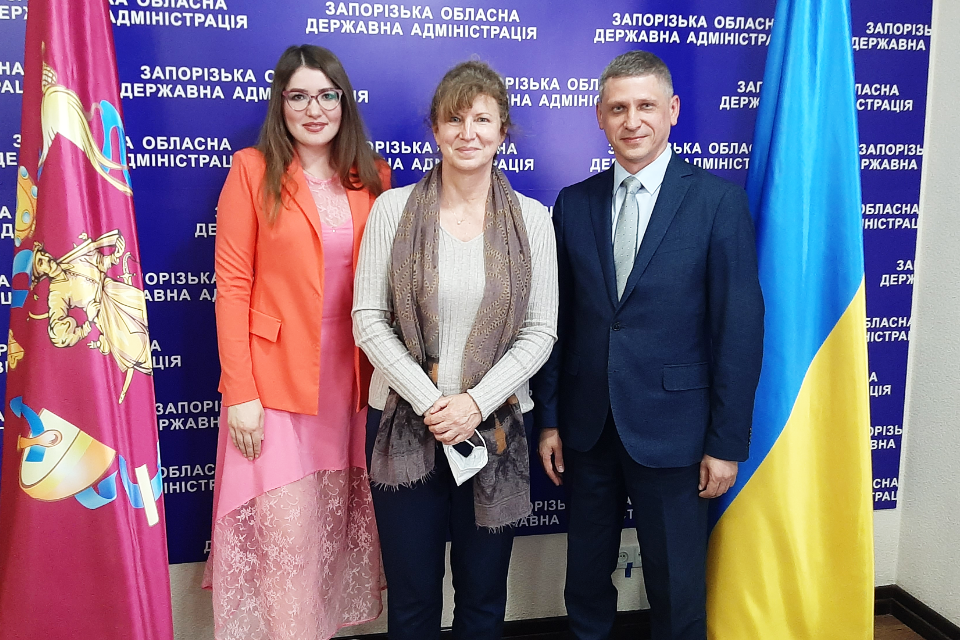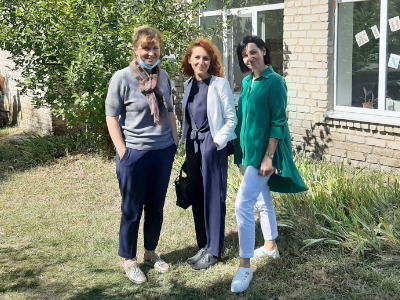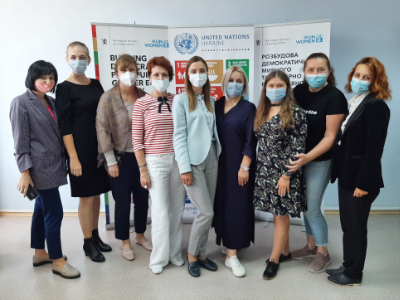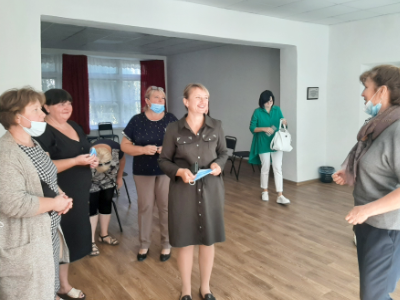Onwards and upwards for gender equality in conflict-affected eastern Ukraine
Date:

UN Women launched the second phase of the “Building democratic, peaceful and gender equal society in Ukraine – Phase II” (2021-2024) project in eastern Ukraine, which aims to empower women in playing a leading role in peace and security processes in the region. As part of the launch, UN Women Country Representative for Ukraine, Erika Kvapilova, held key meetings in Zaporizhzhia, a conflict-affected city in eastern Ukraine, with local women’s groups and government partners to discuss progress made towards gender equality and the necessary next steps.
“This is a pivotal time to prioritise gender quality and women’s empowerment in conflict-affected regions of Ukraine. The COVID-19 pandemic has exacerbated inequalities in already vulnerable communities. Finding entry-points for further collaboration with civil society groups and government partners is key to our collective work to improve the lives of women and girls affected by conflict,” said Erika Kvapilova during the discussions.
By working closely with the government and women’s groups at national, regional and local levels, the project will build on the work undertaken during the first phase, with the ultimate goal of making sure that women can meaningfully participate in peace and security processes at all levels in Ukraine.
“Our meetings in Zaporizhzhia are important opportunities to hear from women themselves about their lived realities, needs and priorities. At the same time, affirming commitment and cooperation with government partners in Zaporizhzhia to build on progress to date is essential as our programme moves forward,” she added.

The project, funded by the Government of Norway, aims to advance the women, peace and security (WPS) agenda, and to localise the National Action Plan designed to realize the UN Security Council resolution 1325 (UNSCR 1325), which reaffirms the important role of women in the prevention and resolution of conflicts, peace negotiations, peacebuilding, peacekeeping, humanitarian response and in post-conflict reconstruction and stresses the importance of their equal participation and full involvement in all efforts for the maintenance and promotion of peace and security.
In a meeting with local authorities of the Komyshuvakha Territorial Community, where some 13,000 people reside including IDPs and Roma groups, Deputy Head of the Community, Nadejda Zaiiats said, “The first phase of the project helped us to develop a strategy for addressing safety issues for women and girls in our communities and we have made good progress. People’s perceptions around women’s rights and their roles in our community have really changed. Their eyes are more open and both men and women are willing to collaborate more to solve local challenges. Now is the time to take even more concrete action.”

“Zaporizhzhia has many internally displaced persons who have left their homes and communities due to the conflict and are seeking to create a safe life for themselves and their families. The COVID-19 pandemic has increased socio-economic disparities with women being even more vulnerable than before. Many women IDPs are facing challenges with unstable housing and access to fair jobs that can support their families. We have provided our inputs to different regional strategies and will continue to advocate for our needs,” says Anastasia Perepelytsa, a member of the Zaporizhzhia Council.
Women members of the Zaporizhzhia Internally Displaced Persons’ Council highlighted the importance of conflict-affected women’s participation in decision-making to ensure that their needs and priorities are well reflected in local strategies, plans and budgets.
UN Women team also visited Schastlyve – a tiny village within the Komyshuvakha community, where there are many women from vulnerable groups, including single mothers, women with disabilities, IDPs and older women. where a women’s self-help group supported under the first phase of the project has set up a Women’s Hub and kindergarten to enhance community cohesion and expand opportunities for women. The hub has, for example, arranged awareness-raising events to prevent gender-based and domestic violence, and conducted social outreach work to support vulnerable groups, such as older women, single mothers and women with disabilities.

“When women from the self-help groups started collaborating, they identified that local women can’t work because they don’t have child care support. Due to the advocacy of the self-help group, the local council allocated money from their budget for the establishment of different activities for children. This was an important step to enable mothers from this local community to seek paid work,” said Zaiiats.
In the second phase, the project intends to build on the important progress made so far. “A big lesson learnt from the first phase was that in order to strengthen women’s ability to contribute to conflict prevention, resolution and recovery, we need to address some of the underlying barriers to their participation, such as their understanding of human rights and gender equality, gaps in service provision and safety concerns. The next phase of the project incorporates human security and economic security as a key focus. The meetings we have had in Zaporizhzhia oblast, especially in local communities, reinforced this priority. We are looking forward to continuing our collaboration with civil society and government partners in Zaporizhzhia so that women can meaningfully participate in peace and security efforts at all levels. Onwards and upwards!,” concluded UN Women Project Manager, Svitlana Zakrynytska.